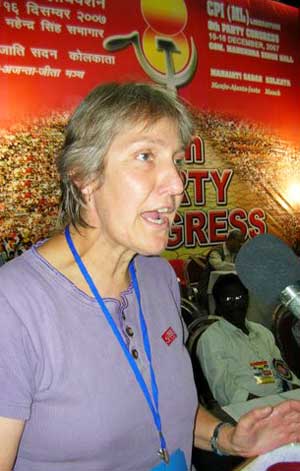[The Assistant National Secretary of the Democratic Socialist Perspective (DSP), Australia, Sue Bolton, attended the CPI (ML)Party Congress right from 10-18 December. Comrade Sue did not just remain confined to the seats of the Congress Hall; she sought out comrades of the working class and peasant fronts and interviewed them; with the DTC workers of Delhi she shared her own experiences of being a bus driver and organizing transport workers; tirelessly interacting with a range of delegates she seemed quite at home and it was difficult to remember that she was a guest!
In the following conversation, Sue Bolton discusses the challenges facing the Left movement in Australia.]
 KK: Did working class issues play any role in the Howard Government’s defeat? In working class struggles, what has been the role of the Labour Party that is now in power?
KK: Did working class issues play any role in the Howard Government’s defeat? In working class struggles, what has been the role of the Labour Party that is now in power?
SB: The Labour Party was most unwilling to launch protests against anti-worker laws introduced by the Howard Government in 2005, saying that if they did so, Labour would be alienated. DSP as well as the Socialist Alliance along with some Labour members built pressure for mass protests and strikes, and got mass protests off the ground in two states (Victoria and W Australia) in mid-June 2005, including one historic strike. For the first time in along time, Labour was no longer in control of all the speaking platforms, and our line was ‘Don’t just wait for elections, we need militant actions.’ We were also able to some extent to break the Labour Party’s monopoly on information. Even where Labour did control speaking platforms, we succeeded in getting strikes and protests off the ground. Howard wouldn’t have been kicked out without those strikes; the anti-workers laws were a main issue in the elections. Labour Governments in the past have had a history of pacifying working class militancy; in the days to come, workers’ issues will remain a key issue which the Labour Government cannot duck.
KK: How do young people in Australia today respond to radical student groups like Resistance?
SB: Times are more challenging for the student movement now than in the 90s. The class composition of campuses and of the student movement has changed. Working class students and poorer students always had to work part-time, but now they are forced to work 20-30 hours a week, and so they have less time for ideas and political activism. The impact of post-modernist identity politics has also helped to destroy political movements on campus. Partly as a consequence, left student groups now often tend not to have a mass character and tend to become somewhat cliquish Left clubs instead.
KK: I heard about ‘voluntary student-unionism’ being introduced in Australian universities – what kind of impact does that have on the student movement?
SB: I was speaking to the JNU Union President and he described how all students on admission pay a fee that makes them all automatically members of the Student Union. That was the case in Australia till a while ago. But the Howard Government had introduced ‘voluntary student-unionism’, which means that the payment of the SU membership fee is made voluntary. The aim was clearly to depoliticise students and make it more difficult for student groups to organise. Also, the SU fees not only funded the unions but also student services. Now the incumbent Labour Government is saying that the fees can go to the Student Unions as long as they are not spent on political activity. This means that Unions will soon run out of money. It may be that this move will discourage student bureaucrats who entered Unions mainly to control the funds, but there is no doubt that the move will weaken the student movement.
But Resistance comrades are still active; in particular Resistance organised some successful walkouts in many cities in protest against Bush’s visit to Australia.
KK: What has been your experience of attending our Kolkata Congress?
SB: What has struck me strongly is the wide range of struggles that your party is leading. For me, this reemphasises that ideology alone cannot do, we’ve got to be intimately connected to class struggles. It’s been a reminder that international solidarity is no doubt important but being rooted in one’s own class struggle is even more crucial

CPIML-Liberation rally in Kolkata in December.
(Sue Bolton at right with camera)
